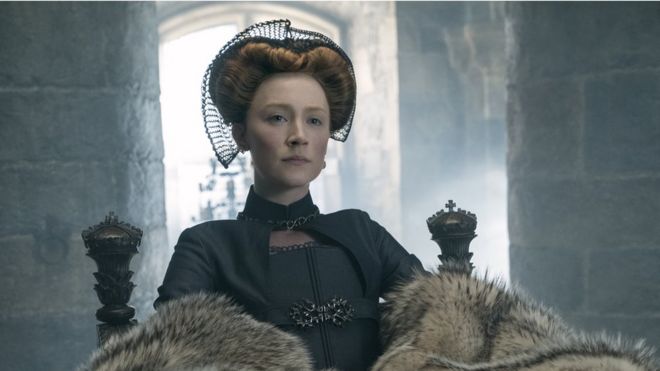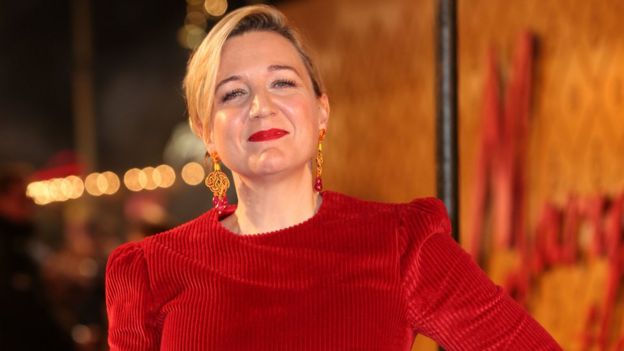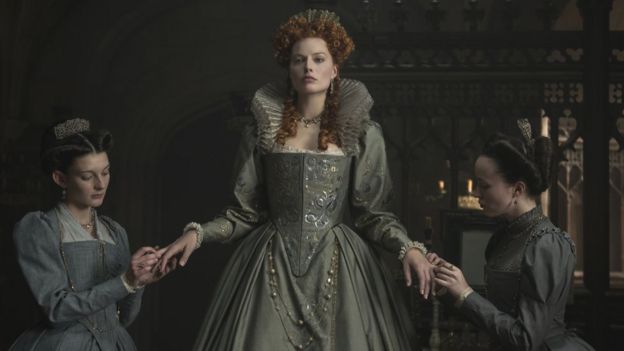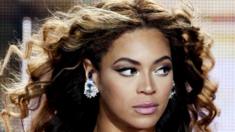 WORKING TITLE
WORKING TITLE
Mary Queen of Scots director Josie Rourke has said she included scenes with menstrual blood in the film to normalise the idea of it.
The Bafta-nominated movie features Saoirse Ronan as Mary and Margot Robbie as her rival Elizabeth I.
One scene in the film shows Mary's blood as she's washing shortly after marrying Henry Darnley.
Rourke told the Press Association it was the "most straightforward scene" in the film.
"In America, I was asked 'how difficult was it to shoot that menstrual blood scene?'" she explained.
"But it was probably the most straightforward scene that we shot because there were six women there and we all know what happens and we all know what to do.
"I think that it's probably one of the few contexts in which I can say normalisation is a good thing, we just need to see that, because it happens to pretty much half of us at some point in our lives and that we've not shown it before is probably just a bit disappointing more than anything else."
- Mary, Queen of Scots film 'problematic'
- Queen of Scots movie to 'benefit' tourism
- Bafta Film Awards 2019: All the nominees
Rourke said the scene was important because it reflected reality, with the renaissance court focused on Mary's body and whether she was going to produce an heir to the throne.
"That is what Elizabeth is thinking about so it filters into the story, but let's just show this stuff so we can start to not be shamed," she said.
 PA
PA
The 42-year-old added that it was a significant part of the film because it shows a modern day audience that little has changed in the way women in power are regarded.
"I think a lot of that, and this is a big part of the film, is to do with how much women's bodies, even when they are crowned heads of Europe or perhaps especially, dominate the conversation."
She added: "Do you remember when Andrea Leadsom [Leader of the House of Commons] came out and said that she was more qualified to lead because she had had a baby? It's still very present, I think."
Rourke, who is the outgoing artistic director of the Donmar Warehouse theatre, said her storytelling has also been improved by drawing on experience of being outnumbered by men in her field.
 WORKING TITLE
WORKING TITLE
"Because I am a woman and I am a woman who had tried to follow paths, even as a theatre director - which you would think was a very inclusive and liberal place, that haven't really been trodden by a lot of women before, you don't have a lot of other women's live to navigate by," she said.
"I think that when that happens to you, naturally some of that flows into your work so I'm almost trying to tell stories that reflect both my experience and my observation of what it's like to be a woman in a male-dominated setting or an unusual setting, what that feels like.
"And it's just not in a 'strong women are great' way, this movie is about telling the whole range what that thing is, how difficult, how embarrassing, how hard, how confusing, how vulnerable that can make you, as well as the strength that is shown."
Follow us on Facebook, on Twitter @BBCNewsEnts, or on Instagram at bbcnewsents. If you have a story suggestion email entertainment.news@bbc.co.uk.
- Mary, Queen of Scots film 'problematic' says historian
- Minister says Queen of Scots movie will boost tourism
- Saoirse Ronan on playing Mary Queen of Scots
- Bafta Film Awards 2019: The nominations in full
- Bafta Film Awards 2019: Olivia Colman's The Favourite leads nominations
- Golden Globes 2019: Full list of winners and nominees


No comments:
Post a Comment